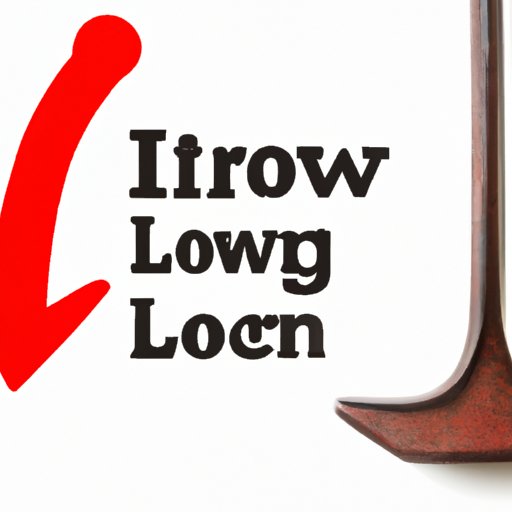
Introduction
Iron deficiency is one of the most common nutrient deficiencies across the world, and it can lead to a host of health problems, including anemia, fatigue, and weakness. But did you know that low iron levels can also contribute to weight gain? In this article, we’ll explore the surprising connection between low iron and body weight, discussing the role of iron in metabolism, anemia, and other factors that can impact weight management.
Our goal is to inform and help people understand this issue, highlighting the importance of iron for overall health and wellness. We’ll cover several topics, including the surprising connection between iron and body weight, the role of iron in metabolism, the relationship between iron deficiency anemia and weight gain, challenges of weight loss with low iron levels and ways to address low iron levels while trying to lose weight.
The Surprising Connection between Iron and Body Weight
Iron is a mineral that plays several crucial roles in the body. It’s best known for its role in facilitating the transport of oxygen throughout the body, but it’s also involved in a wide range of other functions, including the production of new cells and neurotransmitters.
Surprisingly, low iron levels can also affect body weight. Iron is essential for metabolism and the conversion of food into energy. When iron levels are low, metabolism slows down, which means energy is burned more slowly, leading to weight gain.
The Role of Iron in Metabolism: How Low Iron Levels Contribute to Weight Gain
Metabolism refers to the chemical processes in our body that help us maintain our weight, control blood sugar levels, and manage overall health. Iron plays a critical role throughout these processes and is involved in several metabolic pathways, including those responsible for glucose, lipid, and energy metabolism.
Iron is a vital component of hemoglobin, a protein in red blood cells that carries oxygen from the lungs to all parts of the body. Hemoglobin is essential for energy production, and without enough iron, our body can’t produce enough hemoglobin to support metabolism adequately.
When there is a deficiency of iron, the body finds it challenging to create new hemoglobin, slowing down metabolic processes. Food is converted into energy at a slower rate, leading to weight gain.
Iron Deficiency Anemia and Weight Gain: What You Need to Know
Iron deficiency anemia is a condition in which there are not enough red blood cells in the body because of a lack of iron, leading to a deficiency in oxygen-carrying hemoglobin. Anemia can cause fatigue and weakness, making it difficult to be active and contributing to weight gain.
Research also suggests that people with iron deficiency anemia tend to have higher levels of ghrelin, a hormone that stimulates appetite and increases hunger, leading to increased calorie intake and weight gain. This hormone imbalances play into the relationship between iron deficiency and weight gain.
Is Your Low Iron Level the Reason You Can’t Lose Weight?
Low iron levels can make it harder to lose weight, even when people are exercising and eating healthy foods. The reason for this is that iron is essential for efficient calorie burning and fat storage. When iron levels are low, the body has a harder time converting food into energy and burning fat, which slows down weight loss.
Suppose you’re trying to lose weight, and you’ve hit a plateau. In that case, it’s worth checking your iron levels to see if they could be impacting your weight loss goals. By addressing low iron levels, you could give your metabolism a boost and support successful weight loss.
The Link between Iron and Fatigue: How Low Iron Levels Lead to Decreased Physical Activity & Weight Gain
Fatigue and weakness are common symptoms of iron deficiency anemia and low iron levels. When you feel weak, it’s hard to be active, leading to weight gain. You exercise less, and you find yourself easily tired.
Increasing your iron intake can help combat these symptoms, increasing energy levels and promoting more physical activity and reducing weight gain.
Low Iron, Slow Metabolism: Understanding the Relationship Between Iron and Body Fat
Research suggests that there’s a close relationship between iron metabolism and body fat. One study found that iron-deficient women had higher body fat percentages than non-anemic women, highlighting the importance of having sufficient iron stores to maintain a healthy body composition.
It’s worth noting that iron metabolism is complex and involves several different factors that can impact body fat levels, including inflammation, insulin resistance, and oxidative stress.
Conclusion
Low iron levels can contribute to weight gain, anemia, and other health issues, highlighting the importance of getting enough of this vital nutrient. By adding more iron-rich foods to your diet or taking iron supplements as needed, you can promote healthy metabolism, energy levels, and weight management, supporting overall health and well-being.
Remember that low iron levels can be detected through a simple blood test, so if you’re experiencing any of the symptoms above, talk to your healthcare provider and get tested. With the right treatment and support, you can overcome iron deficiency and achieve a healthy weight and lifestyle.





